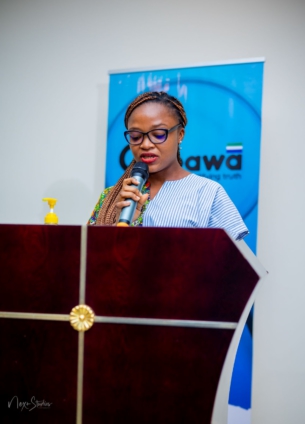
Audio By Carbonatix
Media and research professional Caroline Anipah, has contributed to the critical discourse on the growing issues of misinformation and disinformation, offering valuable insights and strategies to combat these challenges.
Drawing from her extensive experience in research and media, Mrs. Anipah joined Joy News’ AM Show via Zoom to shed light on the complex dynamics of false information. She carefully distinguished between misinformation and disinformation, underlining their unique characteristics and implications.
According to Mrs. Anipah, “Misinformation refers to information that is false but shared without the intention to cause harm.” In contrast, she defined disinformation as “false information deliberately created with the intention to cause harm, shape public opinion, and influence people’s behaviours.”
Highlighting the deliberate nature of disinformation, she remarked, “A lot of emphasis is put into creating disinformation, so it’s not always a mistake by someone. Across the world, disinformation tends to influence behaviours and impacts people’s democracy.”
Mrs. Anipah urged Ghanaians to be vigilant about emerging trends, particularly during sensitive periods such as elections. She noted that the proliferation of disinformation often leaves people unsure of how to interpret or handle the vast amount of information they encounter.
“We’ve noticed that people are increasingly uncertain about how to consume information because they believe there is disinformation everywhere. As a result, they stop tracking the sources of what they read. For instance, as we approach an election, people are confused about what they are hearing,” she said, referencing a recent case involving Wontumi FM to illustrate her point.
Mrs. Anipah emphasised that disinformation is a significant issue in Ghana that requires urgent attention. “I am glad that we are beginning to focus on this, and it’s encouraging to see a collective effort to address the problem,” she stated.
According to UNESCO’s LASP survey, 87% of respondents in a global survey expressed concerns that disinformation could influence elections in their countries with 47% being "very concerned."
Latest Stories
-
US and Iran hold talks seen as crucial to prevent conflict
7 minutes -
Spain to check Gibraltar arrivals under post-Brexit deal
11 minutes -
Insurance cover crucial for canoe fishermen – Prof Benjamin Campion
15 minutes -
Communications Minister engages GIFEC staff, pledges support for welfare and institutional growth
18 minutes -
Zenith Bank pledges support for Ghana Medical Trust Fund ahead of April launch
22 minutes -
Ghana needs offshore patrol vessels to counter piracy effectively – Ntim Fordjour
30 minutes -
Atlas Commodities rejects Assafuah’s warehouse claim, says it operates depots in four regions
33 minutes -
KMA bans sale of explosives at Kejetia Market amid security concerns
44 minutes -
E&P controls 45% of Ghana’s mining operations, eyes greater role in economic growth
58 minutes -
Ghana Navy and Armed Forces complete rescue of 71 fishermen after armed sea robbery off Central coast
1 hour -
Hillary Clinton to testify she ‘had no idea’ of Epstein crimes and calls for Trump to be questioned
1 hour -
Parliament passes Ghana’s first Accelerated National Reserve Accumulation Policy
1 hour -
Investing adequately in waste can earn Ghana GHS 47.9bn in annual benefit by 2032 – ISSER
2 hours -
OSP says extradition and summons proceedings underway in Kenneth Nana Yaw Ofori-Atta case
2 hours -
Update: 71 fishermen rescued after pirate attack off Central Region coast
2 hours

